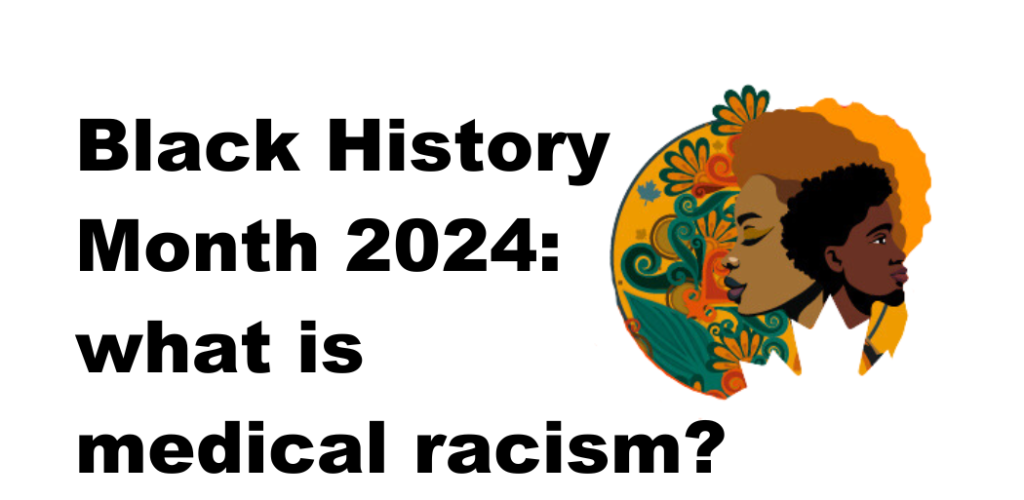

When people talk about racism, you might find that the definition changes depending on who you ask or what context you’re talking about it in. A lot of past conversations about racism focused on how it plays out in a person-to-person context, meaning one person directly mistreating another based on their race. Now when we talk about racism, we often talk about it in a systemic way too, meaning that we’re trying to address how racism comes up in our culture and social institutions (like education, governing, or economics) and the impact that can have on people of colour, especially Black and Indigenous folks. Remember that all parts of our society from laws and social policies, to philosophy and even science are shaped by a collection of individual perspectives and contributions, and with those perspectives comes bias and personal opinions.
Medical racism refers to how those biases show up in the practice of medicine. This could mean a patient being refused care based on their race, or it might mean that the care they receive is worse than the care someone of a different race might receive. It also refers to the history of medicine and how sometimes medical practices we use today actually have their origins in racist practices of the past. We could call that a form of systemic racism, because prejudices of the past end up being built into medical systems today actually affect the care that patients receive and their overall health outcomes.
Health outcomes is a phrase we use to describe what happens to people after they receive some form of medical care. There are lots of ways to measure this, we could look at mental health, physical health, quality of life, how someone manages their disability, and more. Someone having fewer asthma attacks because they use a puffer would be considered a positive health outcome. Someone spending most of their time in pain because their doctor denied them pain medication would be considered a negative health outcome. It can be useful to look at health outcomes across different groups of people: we might look at the differences in health outcomes for people of a certain race, a certain income bracket, or of people who live in a certain area. When we do that, we’re able to see which groups of people are experiencing worse outcomes than others, and then we can begin to look into why that is. In North America people who live in urban areas, who are well off financially, who have citizenship, who speak the language of the area they’re in, and who are usually white tend to have the best health outcomes.
Part of this is because they have access to quality healthcare: they have an easier time physically accessing a doctor, going for regular checkups, communicating their issues, and paying for care. Part of this is also because they’re more likely to have access to fresher and less processed food options, better funded schools, and social programs. Another part of this (which also affects all the other things we listed) is because they do not have to regularly face the same discrimination, prejudice, and stereotypes that non-white (especially Black and Indigenous) people do.
Usually when policies that affect things like health care practices are introduced or changed, they’re done so based on data from reports and studies and feedback from the people the policies might affect. This is an area where Canada is actually lacking, for the most part we don’t collect race-based data for health-related issues which makes it harder to come up with specific solutions to solve problems that affect some racial groups over others. Black folks in particular currently face a number of difficulties when it comes to accessing care: Black patients are thought to have higher pain tolerances or experience less pain than White patients and less likely to be prescribed pain medication, infant mortality rates are three times higher for Black patients than White patients, and that’s to say nothing of the histories of forced sterilizations, unethical medical experimentations, and racist science that has informed our healthcare practices for hundreds of years, or all of the systemic barriers that prevent Black people from accessing healthcare in the first place.
Recommendations have been made by various medical experts, healthcare symposiums, physicians, and communities to encourage the Canadian healthcare system to standardize race-based data collection of patients, include more equity training in medical student curriculums, prioritize hiring Black physicians and medical professionals, and take meaningful steps to repair the damaged relationship between Black communities and the Canadian healthcare system. Many organizations and healthcare professionals are doing this work already, and we’ll continue to share more info throughout the month about what those efforts look like!
While Teen Health Source focuses on information related to sexual health and relationships, we can still suggest resources and further reading if you have more questions, feel free to contact one of our peer educators. [Link]
Last Updated: February 2024

Aside from getting your period, pregnancy tests are the only way to know for sure if you’re pregnant or now. But are at-home pregnancy tests accurate? Yes! They are!

Break ups are complicated. This blog post covers some things to consider while talking with someone about ending your relationship.